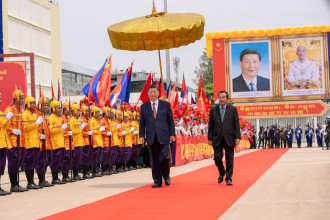-1730187746.jpeg)
NEW DELHI: The Friedrich Naumann Foundation for Freedom, South Asia, hosted a webtalk on ‘BRICS Summit in Kazan: India’s Agenda’, on October 18. The main purpose for organizing the webtalk was to get an understanding from various experts on what India should focus on and what India could get out of the summit to be held in Kazan.
The webtalk started with a virtual address by Prof Dr Thomas Straubhaar, a professor of Economics at the Hamburg University and board member of the Board of Trustees of the Friedrich Naumann Foundation. During his address, Dr Straubhaar stressed that the BRICS Summit being held in Kazan was timely and relevant because there has been a shift in the world order. He mentioned that the old-world order that started after World War II and lasted till the end of the Obama administration in the United States, was characterised by multilateralism.
Dr Straubhaar also shared that in a multilateralism system, the power of law is the dominant criteria, and it leads somehow to the fact that big countries become smaller, and smaller countries become bigger due to the fact that each country is treated in the same manner. He also informed that the return of nationalism means that the law of power substitutes the power of law, and as an outcome, we see a kind of multipolar instead of a multilateral world order.
The webtalk was moderated by Jhanvi Tripathi, an Associate Fellow at the Observer Research Foundation in Delhi. She also served as a coordinator for the 2020 India Secretariat during India's G20 presidency in 2023. Tripathi currently serves on the International Advisory Board Secretariat of Think20 Brasil.
-1730187746.jpeg)
-1730187746.jpeg)
On the occasion, Ruchita Beri, a Senior Fellow at the Vivekananda International Foundation and an expert on India's relations with Africa and Latin America, mentioned that the addition of new members – Ethiopia, Egypt, Iran, Saudi Arabia and UAE – to the BRICS has magnified the significance of this collaboration. She informed that the BRICS was formed fundamentally to reform the current multilateral system. Beri also mentioned that the fundamental reason for BRICS being formed could be derived from the joint statement of the foreign ministers of BRICS who met earlier this year in June in Russia. Apparently, the statement says ‘BRICS calls for a more agile, effective, efficient, responsive, representative, legitimate, accountable international multilateral system, which would lead to greater and more meaningful participation from developing countries, especially Africa, in the global decision-making process and structures, and make them better attuned to the contemporary reality. Beri said that she feels the BRICS member nations are unhappy with the long-drawn bias against the global South and want to reform the current order. She stated that BRICs offers a platform to the Global South, and that really matters.
Meanwhile, another panelist, Professor Eduardo Viola, a Senior Research Fellow at the Institute of Advanced Studies, University of Sao Paulo, and professor of International Relations at the School of International Relations, Getulio Vargas Foundation, Sao Paulo, stated that there is a fundamental contradiction within BRICS itself. He stated that although we are witnessing a transformation of the global order, BRICS is not the true driving force behind this change. The organisation faces an inherent division between two of its major powers – Russia and China – which are autocratic regimes aiming to challenge, undermine, or even dismantle the current liberal democratic global order. On the other hand, the remaining members – India, Brazil, and South Africa – are democratic nations with different values and priorities.
Viola mentioned that this divergence creates a significant internal conflict within BRICS. He also informed that while Russia and China, as higher-income or upper-middle-income countries, may seek a shift away from multilateralism toward a new global framework, Brazil and other democratic members are less aligned with this vision. Thus, BRICS does not truly represent a unified coalition capable of establishing a new global order, as it lacks cohesion in both economic interests and foundational values, he pointed out. He added that from an academic perspective, he sees this fragmentation as a limiting factor for BRICS.
Finally, Dr Rishi Gupta, an Assistant Director at the Asia Society Policy Institute in New Delhi – a division of the Asia Society India Centre, Mumbai, and who works in the areas of diplomacy and geopolitics, said that when we think about BRICS, particularly in the context of this year’s summit in Kazan, it is essential to focus on the theme: Strengthening Multilateralism for Just Global Development and Security. The emphasis here is on 'just,' meaning an inclusive approach that addresses the limitations of current multilateral platforms, which have historically been dominated by the West, he clarified. There’s a growing need for alternative platforms that amplify the voices of countries in the Global South, he added.
Dr Gupta stressed the goal is not to challenge the existing system but to reform it. He added that this moment is timely, as we now see multiple power bases around the world, each deserving a seat at the table and fair representation within global financial systems that have largely excluded them. Dr Gupta further commented that we must also remember that BRICS originally emerged as a counter to the G7, and today we are progressing systematically toward a more balanced global order. He added that regarding whether BRICS will replace the existing multilateral framework or act as a subset, he believes it serves as a reformative force. It is pushing the existing global order to adapt so that nations in the Global South can be meaningfully included, he added.
While wrapping up the webtalk, Dr Carsten Klein, Regional Director, FNF South Asia, thanked all the panelists, participants and facilitators for making the event a success. He stated that this gathering reflects BRICS' significant role in shaping multilateralism, especially relevant to South Asia and beyond. Dr Klein also appreciated the Indian and Brazilian perspectives, highlighting the critical role these democracies play as normative powers within BRICS. He mentions that the discussion illuminated BRICS' bridging role in global structures, particularly the United Nations, showing its impact in fostering balanced reforms without aiming to replace other multilateral systems like the European Union or the United Nations.
READ ALSO:
- FNF South Asia webinar explores ecological challenges for conservation in the Bay of Bengal region
- FNF South Asia hosts webinar titled 'India Votes: Inclusive Democracy 2024'
- FNF South Asia holds conference to address LGBTQIA+ rights in South Asia, Europe
- FNF hosts webinar on Energy Transition and Energy Security in South Asia






